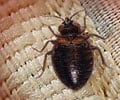American researchers have identified several new potential insect repellants that are three times more potent than DEET, the active ingredient in most tick and insect repellents, a
A new study has claimed that scientists have identified a new insect repellent that is three times more potent than DEET, which is currently the most common type of repellent in use.
In laboratory tests, the new compounds protected human volunteers from mosquitoes two to three times longer than DEET, (n,n-diethyl-m-toluamide), which has served as the gold standard of repellents for more than 50 years.While DEET repellents offer broad-based protection from a variety of insects, mosquitoes continue to spread diseases such as malaria and some mosquitoes can bite through an application of DEET, the paper said.
"It would be good to have more effective repellents that protect against a greater number of insect species," said Ulrich Bernier, a research chemist with the Mosquito and Fly Research Unit of the US Department of Agriculture (USDA) who worked on the project.
Back in the 1940s, it took USDA scientists a decade to screen 40,000 chemical compounds in a search for new and more effective insect repellents. That quest ultimately led them to DEET.
This time around, USDA investigators were able to screen thousands of potential compounds in a matter of just months using a drug discovery computer program that uses information about chemical structures and insect receptors to predict repellents' effectiveness against mosquitoes.
The program allowed the scientists to winnow a field of 2,000 compounds down to just 34, which they then tested on human volunteers in the laboratory. The volunteers were exposed to mosquitoes.
Advertisement
The researchers plan to continue testing on seven of the most promising compounds in their quest to identify the next generation DEET and will be looking to see how effective they are against a range of insect species.
Advertisement
Source-AFP
RAS/L







